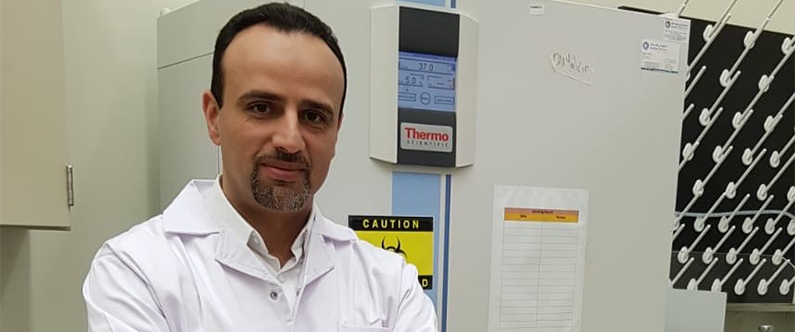WCM-Q research probes causal link between obesity and diabetes
 Dr. Mohamed A. Elrayess of the Biomedical Research Center at Qatar University co-led the study with WCM-Q’s Dr. Mazloum.
Dr. Mohamed A. Elrayess of the Biomedical Research Center at Qatar University co-led the study with WCM-Q’s Dr. Mazloum.
Researchers at Weill Cornell Medicine-Qatar have made new discoveries that could help explain a problem that has perplexed scientists for years – why do some obese people get type-2 diabetes while others do not?
The multi-institutional team of researchers, led by WCM-Q’s Dr. Nayef Mazloum, analyzed blood samples from 107 people resident in Qatar and identified significant differences in the metabolites of those who were obese but insulin sensitive and did not have type 2 diabetes compared to equally obese individuals with insulin resistance and/or type-2 diabetes.

Dr. Mazloum, assistant professor of microbiology and immunology, said: “One of the key characteristics of type-2 diabetes is reduced insulin sensitivity, which is very strongly associated with obesity. However, some individuals who are obese somehow maintain their insulin sensitivity and therefore have a far lower risk of developing type-2 diabetes and associated complications. In this study we were able to identify for the first time a number of individual metabolites that are involved in helping some obese people maintain insulin sensitivity - we hope that it may eventually be possible to use these discoveries as the basis for developing new diagnostic tools and even therapeutic medicines.”
Metabolites are a wide and varied group of molecules involved in the vast complex of chemical reactions that together make up the human metabolism. The research identified metabolites involved in the metabolism of phospholipids, a type of fat found mainly in the membranes of cells. A total of three phospholipid metabolites were identified by the researchers as ‘potential novel biomarkers’ which, if present, appear to indicate that an obese individual may be resistant to type-2 diabetes. Of the 107 subjects in the study, 32 were control subjects of healthy weight, while 75 were obese, including 20 who were obese and insulin sensitive, 41 who were obese and insulin resistant, and 14 who were obese and had type-2 diabetes. The majority of subjects in the study were Qatari nationals.
The team comprised researchers from WCM-Q, Qatar Biomedical Research Institute, the Biomedical Research Center (BRC) at Qatar University, the Royal College of Surgeons in Ireland – Bahrain, and the University of Groningen in the Netherlands. The research, titled ‘Metabolic signature of obesity-associated insulin resistance and type 2 diabetes’, has been published in the Journal of Translational Medicine.
Dr. Mohamed A. Elrayess of the BRC at Qatar University, who co-led the project with Dr Mazloum, said: “This in an extremely exciting piece of research for us because if we can understand what makes some obese individuals with lower risk to insulin resistance and type-2 diabetes, we might be able to help those who are prone to developing those conditions or who already have them. However, while we have gained an improved understanding of the metabolic processes at work, the full nature of the underlying metabolic pathways involved is still quite poorly understood. This research does though point the way towards further studies that could help us develop a far richer and more detailed picture of how type-2 diabetes functions, which could potentially help with the development of new diagnostic tools and therapies.”
The other researchers who contributed to the study were Haya Al-Sulaiti, Ilhame Diboun, Maha Agha, Fatima Mohamed, Stephen Atkin and Alex Dömling. The study authors are grateful to the support obtained from the Qatar National Research Fund (QNRF; Grant No. NPRP8-059-1-009) for this study, as well as support from the Biomedical Research Program of Weill Cornell Medicine—Qatar, a program supported by Qatar Foundation.
Dr. Khaled Machaca, senior associate dean for research, innovations, and commercialization at WCM-Q said: “Type-2 diabetes is one of the most pressing health concerns facing Qatar and the wider region, with more people developing the condition and at earlier ages than was previously the case. This research has opened up promising new avenues to identify and validate biomarkers that would, with further studies, hopefully improve our ability to both prevent and treat type-2 diabetes and associated conditions.”